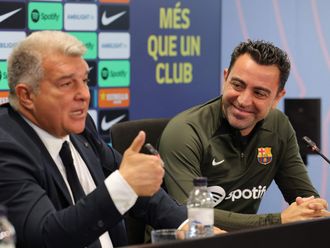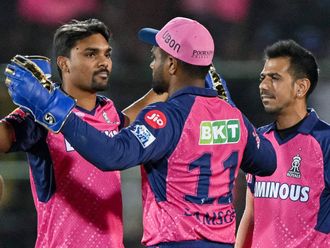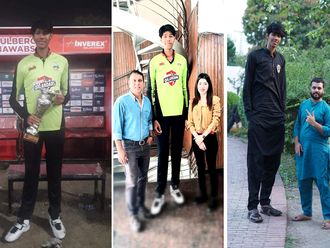Johannesburg: The presence of Burkina Faso, Cape Verde and Togo in the Africa Cup of Nations quarter-finals at the weekend was a shock — the absence of any country from the Maghreb is an even bigger one.
Only once before, in 1992 when quarter-finals were staged for the first time, has the northern region comprising Algeria, Egypt, Libya, Morocco and Tunisia not had a presence among the eight survivors after the mini-league first phase.
Algeria, second behind Ivory Coast on the African rankings going into the tournament, finished last in Group D after an undeserved defeat by Tunisia, a deserved defeat by Togo and a draw with the Ivorian ‘B’ team.
A win over Togo would have taken Tunisia through and had a great chance when awarded a late penalty with the teams level, but Khalid Mouelhi struck the woodwork after converting an earlier spot kick.
Morocco were the unluckiest casualties, leading South Africa twice in a must-win match only to be held 2-2 because the hosts conjured up two great equalisers off curled shots, one by a centre-back.
Coach Rachid Taoussi felt the 2013 tournament came too soon for his young stars, while probably erring in ditching experienced midfielder and captain Houssine Kharja from his Johannesburg-bound squad.
“Our priority has always been the 2014 World Cup qualifiers and the 2015 Cup of Nations [which Morocco hosts], where I am confident this group of players will do well,” said the recently installed Atlas Lions handler.
Tunisia coach and former national team defender Samir Trabelsi has gone backwards after winning the 2011 African Nations Championship for home-based footballers in Sudan soon after taking the reins.
The Carthage Eagles made the last eight at the 2012 Cup of Nations co-hosted by Gabon and Equatorial Guinea and must have fancied getting at least as far this year after Youssef Msakni hit a late winner against Algeria.
Losing leading all-time scorer Issam Jemaa just seven minutes into the first match through injury was a huge blow, but a country that continually impresses in pan-African club competitions should have strength in depth.
“Our elimination was extremely harsh and bitter, especially as the team put in a better level of performance and created many scoring opportunities,” said Trabelsi after the draw with Togo.
Algeria were being touted as possible champions and greying coach Vahid Halilhodzic took a youthful, perhaps too youthful, talented and well prepared squad to a tournament in which they squandered many scoring chances.
“I predict a bright future for this team,” said the Bosnian with previous coaching experience in Africa handling Ivory Coast and Moroccan club Raja Casablanca. “It will be one of the best teams in Africa within two years.”
Egypt and Libya did not even make it to South Africa with the failure of the Pharaohs against the Central African Republic in the first elimination round the biggest shock since Nations Cup qualifying was introduced 47 years ago.
Libya lost a bad-tempered two-leg clash with Algeria and it did not help the Mediterranean Knights that they had to play the ‘home’ fixture in Morocco owing to on-going political tension in Tripoli.
Security issues meant no domestic football in Egypt or Libya last year and many Tunisian fixtures were played behind closed doors, but the Algerian and Moroccan leagues were not affected.
Former Senegalese journalist and Marseille president Mababa ‘Pape’ Diouf believes the glory days of Maghreb football — highlighted by four consecutive Cup of Nations titles between 2004 and 2010 — may be over.
“I am not sure there will be enough talent coming through in the region in the near future to make a difference,” he said. “These Maghreb countries that used to be the vanguard of African football no longer are.”











